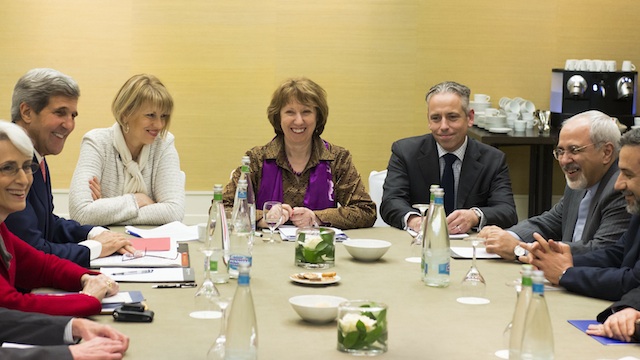SUMMARY
This is AI generated summarization, which may have errors. For context, always refer to the full article.

GENEVA, Switzerland (UPDATED) – Iran and world powers failed to clinch a deal on Tehran’s nuclear program on Sunday, November 10, dashing hopes that an agreement on the decade-old standoff was finally within reach.
Despite an intense three-day diplomatic effort in Geneva, officials said it had not been possible to finalize a deal and that negotiations would resume on November 20.
Hopes for an agreement had soared after top world diplomats rushed to Geneva to join the talks, but faded after cracks began to emerge when France raised concerns about the deal.
EU diplomatic chief Catherine Ashton said there had been “three days of intense and constructive discussions” but that Tehran and the P5+1 group of world powers would have to meet again.
“A lot of concrete progress has been achieved but some issues remain,” she said, adding: “Our objective is to reach a conclusion and that’s what we’ll come back to try to do.”
Iranian Foreign Minister Mohammad Javad Zarif said he was not discouraged despite the failure of the talks.
“I’m not disappointed at all because the meeting we just had, very long, running after midnight, was a good meeting,” Zarif said.
“We are working together and hopefully we will be able to reach an agreement when we meet again.”
French Foreign Minister Laurent Fabius was the first to announce the deal had failed, after earlier raising concerns that the proposal did not go far enough to curb Iran’s nuclear ambitions.
“The meetings in Geneva have made it possible to move forward, but we have not yet managed to conclude (a deal), because there are still some questions remaining to be dealt with,” Fabius said immediately after talks broke up.
Fabius insisted France wanted an agreement, despite claims from some officials that Paris had stymied efforts to reach a deal.
“France wanted from the start to reach a deal on this important Iranian nuclear question,” he said, adding of the next meeting: “We hope at that time to be able to conclude an agreement.”
US Secretary of State John Kerry, who had cut short a Middle East tour to join the talks, was due to make a statement later.
After stretching into a third day on Saturday, November 9, talks had continued into the early hours of Sunday, with Zarif joining ministers from the six powers for a last-ditch effort.
A source close to Fabius said the two sides had moved forward, but not enough.
“There has been progress but there is still work to be done to reach an agreement,” the source said.
The P5+1 group includes the five permanent members of the UN Security Council – Britain, China, France, Russia and the United States – plus Germany.
The purported deal on the table could have seen Iran freeze parts of its nuclear program in exchange for the easing of some of the sanctions that have battered its economy.
The world powers in the talks suspect Iran’s program is aimed at developing nuclear weapons, despite Tehran’s repeated denials.
Iranian President Hassan Rouhani – whose election is widely credited with kickstarting the nuclear talks – had earlier urged world powers not to miss the chance for a deal.
“I hope that the P5+1 group make the most out of this exceptional opportunity that the Iranian nation has offered to the international community, so that we can reach a positive result within a reasonable timeframe,” he was quoted as saying by the official IRNA news agency.
Reports said the proposed deal could have seen Iran stop enriching uranium to 20 percent, which is just a few technical steps from weapons-grade, reduce existing stockpiles and agree not to activate its plutonium reactor at Arak.
Global powers would have in exchange taken limited and “reversible” measures to ease sanctions, such as unfreezing some Iranian funds in foreign accounts.
Negotiators would then have had time to work out a more comprehensive deal that Iran has said it hopes could be in place within a year.
The possible agreement had already come under fire from Tehran’s arch-foe Israel, widely thought to be the Middle East’s sole if undeclared nuclear armed power, which has opposed any move to ease sanctions.
“This is a very bad deal. Israel utterly rejects it,” said Israeli Prime Minister Benjamin Netanyahu.
Iran also expects to sign an accord with the chief of the UN nuclear watchdog on Monday that will include “concrete actions”, Tehran’s ambassador to the agency, Reza Najafi, told state television.
The two tracks of talks – with the IAEA and P5+1 – over Iran’s atomic activities were given new momentum by the June election of Rouhani, seen as a relative moderate.
Iran is anxious for relief from crippling US and European Union economic sanctions that have cut oil revenues by more than half, caused the value of its currency to plunge and pushed inflation above 40 percent. – Rappler.com
Add a comment
How does this make you feel?
There are no comments yet. Add your comment to start the conversation.